Entry And Start System -- Operation Check |
| ENTRY AND START SYSTEM OPERATION INSPECTION |
Check the entry unlock function.
Use the wireless lock operation to lock the front door. With the key in your possession, touch a front door outside handle (touch sensor) and check that the door unlocks.
Check the entry unlock operation detection area.
Step 1: Hold the key at the same height as the door outside handle (approximately 0.8 m (2.62 ft.)). Pay attention to the direction of the key in the illustration.
Step 2: Check that when the key is brought within 0.7 to 1.0 m (2.30 to 3.28 ft.) of the vehicle, the system enters unlock standby mode.
- HINT:
- Unlock standby mode is signified by the key red LED illuminating.
Step 3: After the system enters unlock standby mode, touch the outside handle sensor within 3 seconds. Check that the door unlocks.
- NOTICE:
- The key may not be able to communicate with the system within a 0.2 m (0.656 ft.) radius of each outside handle.
Step 4: Repeat step 2 and step 3 for the remaining front door.
Step 5: Inspect the touch sensor. Wear protective gloves, set the system to unlock standby mode, and check that touching the inner side of the outside handle (the highlighted area in the illustration) with your finger causes the door to unlock.
- NOTICE:
- When touching the highlighted area, tapping too quickly or having extended contact may not trigger the sensor. In such a case, the door will not unlock.
Step 6: Repeat step 5 for the remaining front door.
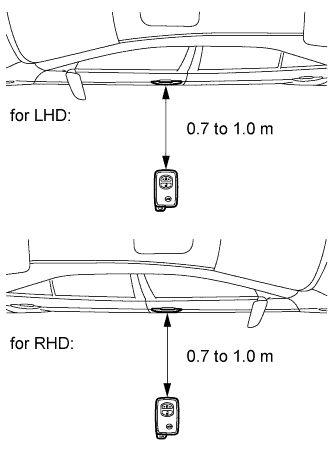
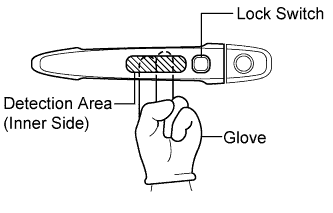
Check the entry lock function.
Step 1: Close all of the vehicle doors. With the key outside the vehicle, check that pressing the lock switch locks the doors.
- HINT:
- When pressing the lock switch, hold the electrical key transmitter about 1 m (3.28 ft.) above the ground and about 0.3 m (0.984 ft.) away from the vehicle as shown in the illustration.
- Due to the key being unable to communicate with the system within a 0.2 m (0.656 ft.) distance from the outside handle, do not press the lock switch with the same hand that is holding the key. The doors may not lock.
- If the key lock-in prevention function buzzer sounds, radio waves from the indoor electrical key oscillator may be leaking from the vehicle. Perform the same check for the front passenger side and rear doors.
Step 2: Repeat step 1 for the remaining doors.
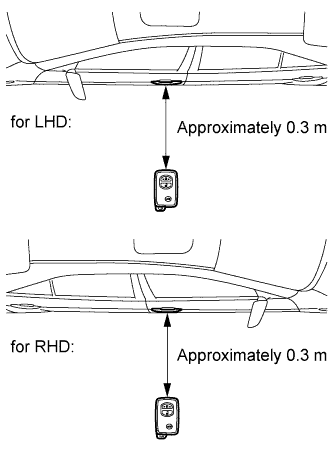
Check the entry luggage compartment door open function.
Close the luggage compartment door. With the key outside the vehicle, check that pressing the luggage door opener switch opens the luggage compartment door.
Inspect the entry luggage compartment door open operation detection area. Hold the key at the same height as the luggage door opener switch (approximately 0.8 m (2.62 ft.)) aligning it with the center of the rear of the vehicle. Pay attention to the direction of the key shown in the illustration. Check that when the key is brought within 0.7 to 1.0 m (2.30 to 3.28 ft.) of the vehicle, pressing the luggage door opener switch opens the luggage compartment door.
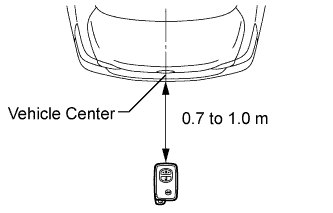
Check the entry ignition function.
While holding the key, confirm that the engine switch indicator light illuminates green when the engine switch is off, the shift lever is in P and the brake pedal is depressed. With the engine switch indicator illuminates green, confirm that the engine starts when the engine switch is pressed.
While holding the key, confirm that the engine switch turns off → on (ACC) → on (IG) → off every time the engine switch is pressed when the brake pedal is not depressed.
- HINT:
- When the engine switch is pressed with the engine switch on (IG) and the shift lever is in any position except P, the engine switch will not turn off but remain on (ACC).
With the engine running, vehicle stopped and shift lever in P, confirm that pressing the engine switch turns the engine off, and that the steering lock engages after opening the driver door.
- HINT:
- When the engine switch is pressed with the engine switch on (IG) and the shift lever in any position except P, the engine switch will not turn off but remain on (ACC).
Inspect the entry ignition operation detection area (front seat). Pay attention to the direction of the key in the illustration. When the key is in either of the 2 locations in the illustration, check that the engine can start.
- NOTICE:
- The engine may not start when the key is on the instrument panel or rear package tray, or in the glove box.
Inspect the entry ignition operation detection area (rear seat). Pay attention to the direction of the key in the illustration. When the key is in either of the 2 locations in the illustration, check that the engine can start.
- NOTICE:
- The engine may not start when the key is on the instrument panel or rear package tray, or in the glove box.
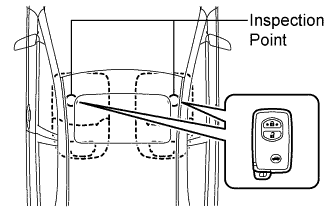
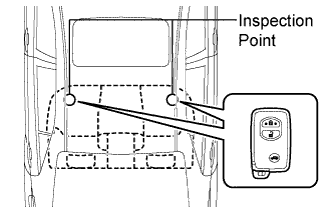
Check the key lock-in prevention function (for luggage compartment).
Place the key in the luggage compartment with all doors locked. Check that: 1) closing the luggage compartment door triggers the key wireless buzzer (which lasts approximately 2 seconds), and 2) pressing the luggage door opener switch opens the luggage compartment door.
Inspect the key lock-in prevention detection area. Pay attention to the direction of the key shown in the illustration. When the key is in either of the 2 locations in the illustration, check that: 1) closing the luggage compartment door sounds the wireless buzzer, and 2) pressing the luggage door opener switch opens the luggage compartment door.
- NOTICE:
- If the key is inside a metal storage item, such as a metal briefcase or metal box, the key will not be able to be detected by the system.
Inspect the key lock-in prevention detection area and the entry door control receiver for wave leaks. Hold the key at the same height as the lower edge of the luggage compartment door aligning it with the center of the rear of the vehicle. Pay attention to the direction and position of the key shown in the illustration. Check that when the key is over 0.1 m (0.328 ft.) from the vehicle rear bumper, the wireless buzzer does not sound. If the warning buzzer sounds, the entry door control receiver may have a wave leak.
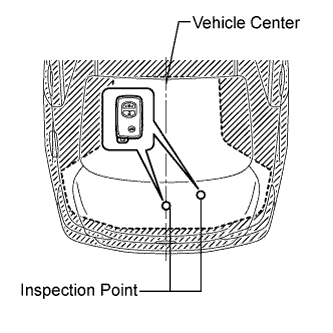
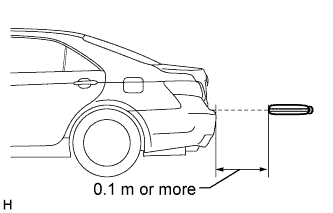
Check the key cancel function.
While the engine switch is on (IG), check that the luggage door opener switch is the only switch in the entry and start system that can be operated.
While the key cancel function (entry and start system cancel function) is on, check that all functions in the entry and start system cannot be operated.
Check the answer-back function (hazard warning light flashing).
Entry Operation Hazard Warning Light Entry Door Lock Flashes once Entry Door Unlock Flashes twice Entry Luggage Compartment Door Open Does not flash Check that the key reminder warning buzzer sounds.
Carry the key in the vehicle and close the driver side door. Then turn the engine switch off or on (ACC).
Open the driver side door and check that the buzzer sounds intermittently.
Check that the key reminder warning buzzer stops.
When the buzzer is sounding, check that the buzzer stops sounding if either of the following is performed:
- Close the driver side door (front door courtesy light switch is off).
- Turn the engine switch on (IG).
- Close the driver side door (front door courtesy light switch is off).
| KEY DIAGNOSTIC MODE |
- HINT:
- Key diagnostic mode checks if the electrical key transmitter within a selected oscillator/amplifier detection area is operating normally. The results are output through the wireless door lock buzzer.
Connect the intelligent tester to the DLC3.
Turn the engine switch on (IG).
Turn the intelligent tester on.
Enter the following menus: Body / Entry & Start / Utility / Key Communication Check.
Check the values by referring to the table below.
Certification ECU (Smart Key ECU Assembly) Tester Display Inspection Range Overhead + Driver Side*1 Door electrical key oscillator (for driver side) Overhead + Passenger Side*2 Door electrical key oscillator (for front passenger side) Overhead + Front Room*3 Indoor electrical key oscillator (for front floor) Overhead + Rear Room*4 Indoor electrical key oscillator (for rear floor) Overhead + Luggage (outside)*5 Outside electrical key oscillator (for luggage compartment) Overhead + Luggage (inside)*6 Indoor electrical key oscillator (for luggage compartment) Immobiliser Amp*7 Amplifier (engine switch) When the electrical key transmitter is brought near the selected oscillator/amplifier, check that the wireless door lock buzzer sounds.
*1: Door electrical key oscillator (for driver side)
- HINT:
- Hold the key at the same height as the door outside handle (0.7 to 1.0 m (2.30 to 3.28 ft.)). Make sure that the direction of the key is as shown in the illustration.
- *2: Perform the same inspection above for the door electrical key oscillator (for front passenger side).
*3: Indoor electrical key oscillator (for front floor)
- HINT:
- Place the key on the driver or front passenger seat cushion.
*4: Indoor electrical key oscillator (for rear floor)
- HINT:
- Place the key on the rear seat cushion.
*5: Outside electrical key oscillator (for luggage compartment)
- HINT:
- Hold the key at the same height as the rear bumper upper surface and align with the center of the rear of the vehicle (0.7 to 1.0 m (2.30 to 3.28 ft.)). Make sure that the direction of the key is as shown in the illustration.
*6: Indoor electrical key oscillator (for luggage compartment)
- HINT:
- Place the key on the inspection points.
*7: Amplifier (engine switch)
- HINT:
- Touch the engine switch while facing the logo side of the key to the engine switch.





